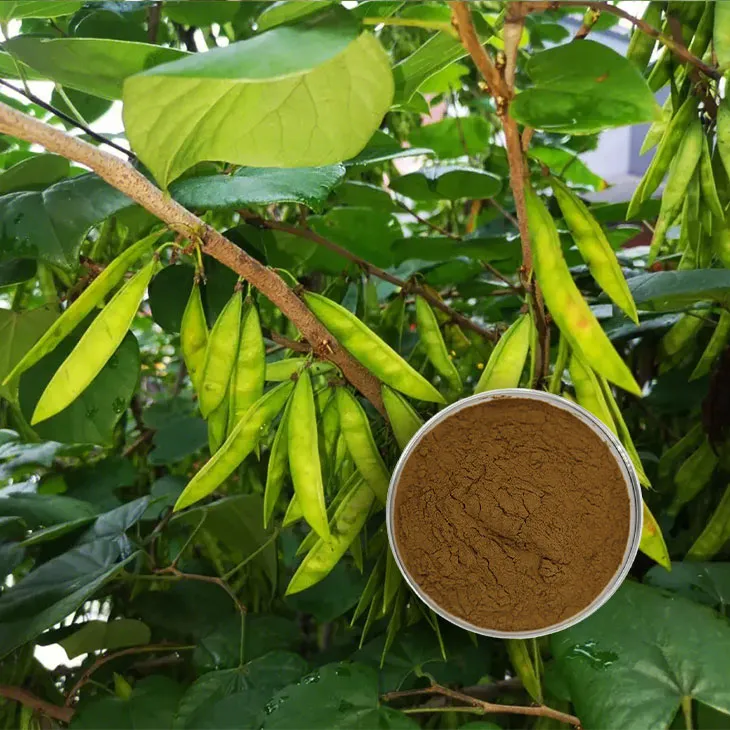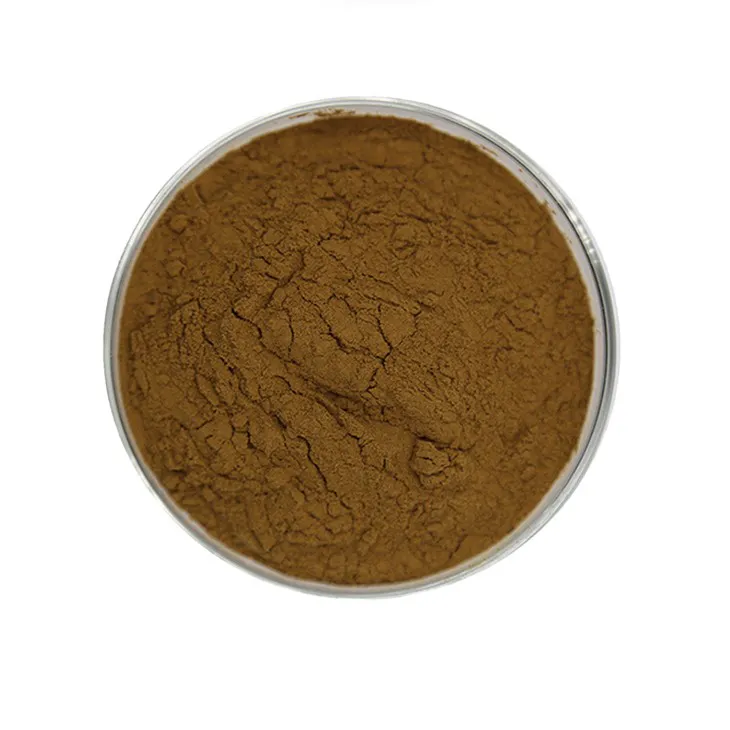- 0086-571-85302990
- sales@greenskybio.com
Five Efficacy of Saponin Extracts + Dosage, Side Effects
2024-11-14

1. Introduction
Saponin Extracts have emerged as a topic of great interest in recent years, owing to their diverse range of potential health benefits. These natural compounds are found in a variety of plants and have been the subject of extensive research. This article aims to explore five key efficacies of Saponin Extracts, namely anti - inflammatory, antioxidant, immunomodulatory, anti - cancer, and hypolipidemic effects. Additionally, it will discuss appropriate dosage and potential side effects to provide a comprehensive understanding for those interested in these extracts.

2. Anti - inflammatory Effects
2.1 Mechanisms
Saponin Extracts exert their anti - inflammatory effects through multiple mechanisms. One of the main ways is by modulating the production of inflammatory mediators. For example, they can inhibit the release of cytokines such as interleukin - 1β (IL - 1β) and tumor necrosis factor - α (TNF - α), which are key players in the inflammatory response. Additionally, saponins can interfere with the activation of inflammatory signaling pathways, such as the nuclear factor - κB (NF - κB) pathway. By suppressing the activation of NF - κB, saponin extracts can reduce the transcription of genes encoding inflammatory proteins.
2.2 Evidence from StudiesSeveral in vitro and in vivo studies have provided evidence for the anti - inflammatory effects of saponin extracts. In vitro studies using cell cultures have shown that saponins can reduce the production of inflammatory markers in stimulated immune cells. For instance, in macrophage cell lines, treatment with saponin extracts led to a significant decrease in the secretion of IL - 1β and TNF - α in response to lipopolysaccharide (LPS) stimulation. In vivo studies in animal models of inflammation, such as those with induced arthritis or colitis, have also demonstrated that saponin - treated animals exhibited reduced signs of inflammation compared to control animals. These include decreased joint swelling in arthritis models and reduced intestinal inflammation in colitis models.

3. Antioxidant Effects
3.1 How Saponins Act as Antioxidants
Saponin extracts possess antioxidant properties mainly due to their ability to scavenge free radicals. Free radicals are highly reactive molecules that can cause oxidative damage to cells, leading to various diseases and aging. Saponins can donate electrons to free radicals, thereby neutralizing them and preventing them from causing further damage. Moreover, saponins can also enhance the activity of endogenous antioxidant enzymes, such as superoxide dismutase (SOD), catalase (CAT), and glutathione peroxidase (GSH - Px). These enzymes play crucial roles in the body's antioxidant defense system by converting harmful free radicals into less reactive molecules.
3.2 Research Findings on Antioxidant ActivityStudies have shown that saponin extracts have significant antioxidant activity. In vitro antioxidant assays, such as the DPPH (2,2 - diphenyl - 1 - picrylhydrazyl) radical scavenging assay and the ABTS (2,2' - azinobis - (3 - ethylbenzothiazoline - 6 - sulfonic acid)) radical cation scavenging assay, have demonstrated that saponin extracts can effectively scavenge free radicals. In addition, in vivo studies in animal models have indicated that saponin - supplemented diets can increase the levels of antioxidant enzymes in tissues and reduce oxidative stress markers. For example, in rats fed with saponin - rich diets, there was an increase in SOD and CAT activities in the liver and a decrease in lipid peroxidation products, which are indicators of oxidative damage.

4. Immunomodulatory Effects
4.1 Influence on the Immune System
Saponin extracts can modulate the immune system in both innate and adaptive immunity. In the innate immune system, they can enhance the phagocytic activity of macrophages and neutrophils, which are the first line of defense against pathogens. This is achieved by activating surface receptors on these immune cells, leading to increased engulfment and clearance of foreign particles. In the adaptive immune system, saponins can influence the function of lymphocytes. For example, they can stimulate the proliferation and differentiation of T lymphocytes, which play important roles in cell - mediated immunity. Additionally, saponin extracts can also affect B lymphocyte function, potentially modulating antibody production.
4.2 Immunomodulatory Effects in Health and Disease
- In healthy individuals, the immunomodulatory effects of saponin extracts may help maintain a balanced immune response, preventing excessive immune reactions or immunodeficiency.
- In disease states, such as infections or autoimmune disorders, saponin - based immunomodulation may offer potential therapeutic benefits. For example, in some animal models of viral infections, saponin treatment has been shown to enhance the immune response against the virus, leading to faster clearance of the pathogen. In autoimmune diseases, where the immune system attacks the body's own tissues, saponin extracts may help regulate the overactive immune response and reduce tissue damage.

5. Anti - cancer Effects
5.1 Anti - cancer Mechanisms
- Saponin extracts can induce apoptosis (programmed cell death) in cancer cells. This is achieved through various mechanisms, such as activating apoptotic signaling pathways and disrupting mitochondrial function in cancer cells. For example, some saponins can upregulate the expression of pro - apoptotic proteins, such as Bax, and downregulate anti - apoptotic proteins, like Bcl - 2, leading to an imbalance that promotes cell death.
- Another anti - cancer mechanism of saponin extracts is their ability to inhibit cancer cell proliferation. They can interfere with the cell cycle progression of cancer cells, arresting them at specific stages, such as the G0/G1 or G2/M phase. This prevents the cancer cells from dividing and multiplying uncontrollably.
- Furthermore, saponin extracts may also have anti - angiogenic properties. Angiogenesis, the formation of new blood vessels, is crucial for tumor growth and metastasis. By inhibiting angiogenesis, saponin extracts can starve tumors of the nutrients and oxygen they need to grow, thereby suppressing tumor development.
- Studies in vitro have shown that saponin extracts can effectively kill various types of cancer cells, including breast cancer, lung cancer, and colon cancer cells. For example, in breast cancer cell lines, treatment with certain saponin compounds led to a significant decrease in cell viability and an increase in apoptotic cell death.
- In vivo studies in animal models of cancer have also provided evidence for the anti - cancer effects of saponin extracts. Mice implanted with tumor cells and treated with saponin extracts showed reduced tumor growth compared to control mice. In some cases, there was also a decrease in the number of metastatic nodules, indicating that saponin extracts may have anti - metastatic potential as well.
6. Hypolipidemic Effects
6.1 How Saponins Affect Lipid Metabolism
- Saponin extracts can influence lipid metabolism by inhibiting the absorption of dietary lipids in the intestine. They can interact with bile acids, which are essential for lipid digestion and absorption, forming complexes that are less likely to be absorbed. This results in a decrease in the amount of dietary fat that enters the bloodstream.
- Moreover, saponins can also modulate lipid metabolism at the hepatic level. They can affect the synthesis and breakdown of lipids in the liver. For example, some saponins can inhibit the activity of enzymes involved in lipid synthesis, such as fatty acid synthase (FAS), leading to a reduction in the production of triglycerides and cholesterol in the liver.
- In animal studies, saponin - supplemented diets have been shown to lower plasma lipid levels. For example, in rats fed with high - fat diets and supplemented with saponin extracts, there was a significant decrease in serum triglyceride, total cholesterol, and low - density lipoprotein (LDL) - cholesterol levels compared to rats fed with high - fat diets alone. At the same time, there was an increase in high - density lipoprotein (HDL) - cholesterol levels, which is beneficial for cardiovascular health.
- Some human studies have also suggested a potential hypolipidemic effect of saponin - containing foods or supplements. However, more research is needed to confirm these findings and to determine the optimal dosage and treatment duration in humans.
7. Dosage of Saponin Extracts
7.1 Determining the Appropriate Dosage
The appropriate dosage of saponin extracts can vary depending on several factors, including the type of saponin, the source of the extract, and the intended use (e.g., for therapeutic or preventive purposes). In general, dosages used in research studies range from a few milligrams to several grams per day. For example, in some anti - inflammatory studies, saponin extracts were administered at a dosage of 50 - 500 mg per day in animal models. However, when considering human use, it is crucial to take into account individual differences such as body weight, age, and overall health status.
7.2 Considerations for Different Applications
- For preventive health purposes, lower dosages may be sufficient. For instance, if saponin extracts are used to maintain a healthy immune system or to provide antioxidant protection, a daily dosage of 50 - 200 mg may be appropriate.
- When used for therapeutic applications, such as in the treatment of certain diseases, higher dosages may be required. However, this should be done under the supervision of a healthcare professional, as higher dosages may also increase the risk of side effects.
8. Side Effects of Saponin Extracts
8.1 General Side Effects
- Some people may experience gastrointestinal side effects when taking saponin extracts. These can include nausea, vomiting, diarrhea, or abdominal discomfort. These side effects are usually mild and may subside as the body adjusts to the extract. However, if they persist or become severe, it is advisable to stop taking the extract and consult a healthcare provider.
- In some cases, saponin extracts may cause allergic reactions. Allergic symptoms can range from mild skin rashes to more severe reactions such as difficulty breathing or anaphylaxis. Individuals with a known allergy to plants from which the saponin extracts are derived should avoid using these products.
There is currently limited information regarding the long - term side effects of saponin extracts. However, due to their potential effects on various physiological processes, long - term use at high dosages may pose some risks. For example, continuous high - dosage use may have an impact on liver or kidney function, although more research is needed to confirm this. It is important to note that when using saponin extracts for extended periods, regular monitoring of health parameters may be advisable.
9. Conclusion
Saponin extracts offer a range of potential health benefits, including anti - inflammatory, antioxidant, immunomodulatory, anti - cancer, and hypolipidemic effects. However, it is essential to consider the appropriate dosage and potential side effects when using these extracts. More research is still needed to fully understand the mechanisms of action of saponin extracts and to optimize their use in various health applications. With further investigation, saponin extracts may hold great promise as natural agents for promoting health and treating diseases.
FAQ:
What are the anti - inflammatory mechanisms of saponin extracts?
Saponin extracts can exert anti - inflammatory effects through multiple pathways. They may inhibit the production of pro - inflammatory cytokines such as interleukin - 1β (IL - 1β), interleukin - 6 (IL - 6), and tumor necrosis factor - α (TNF - α). Additionally, saponin extracts can interfere with the activation of inflammatory signaling pathways, like the nuclear factor - κB (NF - κB) pathway, thereby reducing inflammation.
How do saponin extracts show antioxidant properties?
Saponin extracts possess antioxidant properties mainly by scavenging free radicals. They can neutralize reactive oxygen species (ROS) and reactive nitrogen species (RNS), which are harmful substances generated in the body during normal metabolism or due to external factors. By doing so, saponin extracts help protect cells from oxidative damage and maintain cellular function.
What is the role of saponin extracts in immunomodulation?
Saponin extracts can enhance or regulate the immune system. They may stimulate the proliferation and activation of immune cells such as lymphocytes, macrophages, and dendritic cells. Moreover, saponin extracts can modulate the balance between the humoral immune response and the cell - mediated immune response, thus strengthening the body's overall immune defense.
How do saponin extracts function in anti - cancer?
Saponin extracts can act on cancer cells in various ways. They may induce apoptosis in cancer cells, which is a programmed cell death process. Some saponin extracts can also inhibit the growth and metastasis of cancer cells by interfering with cell cycle regulation or angiogenesis. Additionally, they may enhance the body's immune response against cancer cells.
What is the mechanism of the hypolipidemic effect of saponin extracts?
The hypolipidemic effect of saponin extracts may be related to several mechanisms. They can inhibit the absorption of dietary lipids in the intestine, reduce the synthesis of lipids in the liver, and promote the metabolism and excretion of lipids. For example, some saponin extracts may interact with lipid - binding proteins or enzymes involved in lipid metabolism.
Related literature
- The Beneficial Effects of Saponin Extracts on Health"
- "Saponin Extracts: Dosage, Efficacy, and Safety"
- "A Review on the Anti - inflammatory Properties of Saponin Extracts"
- ▶ Hesperidin
- ▶ citrus bioflavonoids
- ▶ plant extract
- ▶ lycopene
- ▶ Diosmin
- ▶ Grape seed extract
- ▶ Sea buckthorn Juice Powder
- ▶ Beetroot powder
- ▶ Hops Extract
- ▶ Artichoke Extract
- ▶ Reishi mushroom extract
- ▶ Astaxanthin
- ▶ Green Tea Extract
- ▶ Curcumin Extract
- ▶ Horse Chestnut Extract
- ▶ Other Problems
- ▶ Boswellia Serrata Extract
- ▶ Resveratrol Extract
- ▶ Marigold Extract
- ▶ Grape Leaf Extract
- ▶ blog3
- ▶ blog4
- ▶ blog5
-
Organic Tongkat Ali extract powder factory.
2024-11-14
-
How to make powder with ashwagandha extract.
2024-11-14
-
Rosehip extract manufacturers from China.
2024-11-14
-
The best cat's claw extract in nature.
2024-11-14
-
Chinese Dandelion Leaf Extract Suppliers.
2024-11-14
-
Tongkat Ali Extract Powder
2024-11-14
-
Jujube Extract
2024-11-14
-
Curcumin
2024-11-14
-
Beetroot Powder
2024-11-14
-
Tinospora cordifolia extract
2024-11-14
-
Citrus bioflavonoids
2024-11-14
-
Fig Extract
2024-11-14
-
Soy Extract
2024-11-14
-
Longan Extract
2024-11-14
-
Pine bark Extract Powder
2024-11-14





















